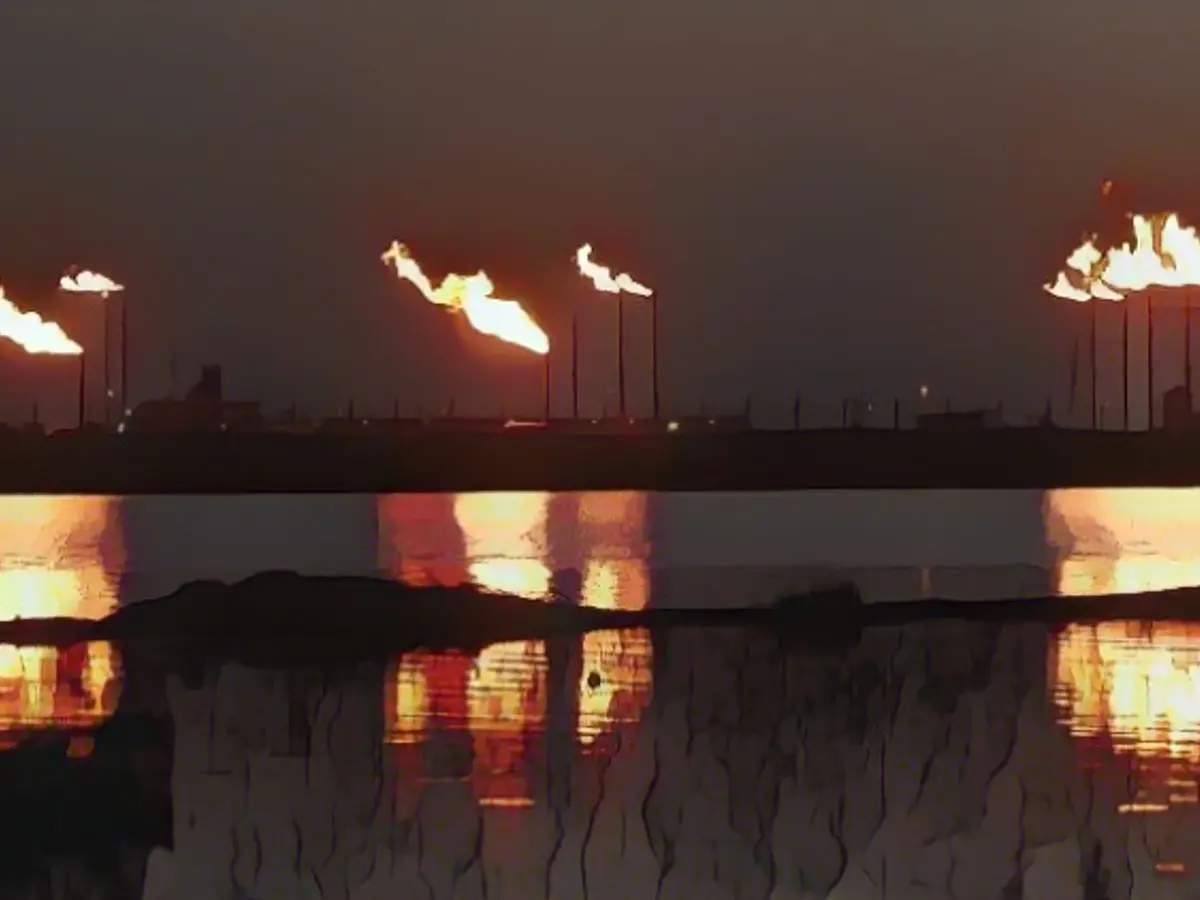"The oil states are getting nervous"
The UN Climate Change Conference, COP28, was certainly not a breakthrough. But the Dubai decision makes it clear where the journey is heading, says climate expert Frauke Röser: "It's the beginning of the end for coal, oil and gas." Even the oil-producing countries have now understood "that they are sitting on a product that will probably no longer be in such high demand in the future".
ntv.de: Will COP28 really "de facto seal the end of the fossil age", as Federal Foreign Minister Annalena Baerbock said? Or is that optimism for a purpose?

Frauke Röser: Annalena Baerbock is a diplomat, so you talk differently about the results of a conference like this. Of course it is good that all fossil fuels are mentioned in a final declaration for the first time, including oil and gas as well as coal. The final declaration does not commit to a phase-out, but only to a move away from fossil fuels. But it is clear where the journey is heading: it is the beginning of the end for coal, oil and gas. In view of the climate policy situation, the only question is whether this will happen quickly enough. After all, it is of no use if the COP decides to move away from coal, oil and gas, but the practical implementation is postponed to the distant future.
The Emirati conference president Sultan al-Jaber presented a rather unambitious draft for the final declaration on Monday evening. Was this a ploy to make the actual final declaration look better?
It seemed a bit like a negotiating tactic from the bazaar: the seller's first offer is so bad that you're happy in the end if you only have to pay half. However, I would question whether this is a good deal.
What is the point of a climate conference calling on the countries of the world to turn away from fossil fuels - when everyone knows that the oil and gas-producing countries have no interest in doing so and that the energy transition in the industrialized countries is progressing far too slowly?
The resolution with the explicit reference to the transition away from fossil fuels is now part of the framework of international climate policy. This is a basis that we can work with. There were many countries at the COP that would have liked a clearer final text, including the European Union. All these countries can now move forward. If the 130 countries that called for a stronger resolution now also implement the move away from fossil fuels, then the global economy will also move in that direction.
Is that happening?
Only partially, for example in the expansion of renewable energies. But moving away from coal, oil and gas also means that there must be no new investment in fossil fuel infrastructure. Germany has not necessarily been one of the pioneers in this area recently.
Because of the development of LNG terminals?
Yes, investments in LNG terminals on this scale are certainly not compatible with the Paris Agreement and the 1.5 degree target.
Many climate conferences bring success on detailed issues. Was there anything like this in Dubai?
This success was announced right at the start of the conference: the agreement on the "Loss and Damage Fund", a fund for losses and damage caused by climate change. Vulnerable states and developing countries have been calling for such a fund for years. The fact that it now exists is a success. Even if it is still inadequately equipped, this is an important step and a signal to the countries most affected.
The final declaration clearly states that the countries are emitting far too much CO2 in order to achieve their self-imposed target of 1.5 degrees. Doesn't that invalidate the whole process?
I was very critical of this COP, partly because the presidency had a dual role: the COP chairman Sultan Ahmed al-Jaber is not only the technology minister of the United Arab Emirates, but also the head of the state oil company. It was clear from the outset that this would be a problem. Moreover, all decisions at climate conferences have to be unanimous, so the outcome is always the lowest common denominator. Nevertheless, it is an important forum.
What do you think of the climate club initiated by Federal Chancellor Olaf Scholz? Is it a good addition to the climate conferences, perhaps even an alternative?
Definitely not an alternative, because this club only represents some of the global states. In principle, forums in which countries and people come together and work together constructively are always a good thing. In the case of the Climate Club, we still need to see how it is structured and what happens there - that has been somewhat vague so far.
An appeal by the oil cartel OPEC to its members caused quite a stir during the conference. How do you classify this process?
On the positive side, the letter shows that the climate conference is being taken seriously and that importance is being attached to it. It is hardly surprising that the OPEC states have no particular interest in digging up their own market. And it should not really happen that so many fossil fuel lobbyists influence the climate conference. That's why I would have liked this COP to be used as an opportunity to look at how the process can be reformed: It is quite enough for negotiators and civil society observers to participate. Access for private sector players, especially lobbyists, should be blocked.
Does the OPEC letter show that the oil states are afraid or that they are still very influential?
Both, although fear is perhaps an exaggeration. But there is certainly a certain nervousness in the oil states. They know that they are sitting on a product that will probably no longer be in such high demand in the future. This means that they will also have to transform their own economies. They want to postpone this process for as long as possible.
The next COP will take place in Azerbaijan.
That's not exactly ideal. Last year it was a gas-producing country, this year an oil country and next year a gas country again, especially in a difficult geopolitical sphere of influence.
Azerbaijan is allied with Russia and has just waged war against its neighbor Armenia.
But apparently this could not be prevented due to the regional proportional representation of the United Nations. Nevertheless, it would be good if at least the size of the conference was designed in such a way that it does not become a conference of the oil and gas industry.
The final text of COP28 explicitly permits CCS in order to achieve climate neutrality, i.e. the capture and storage of carbon dioxide. The head of the Potsdam Institute for Climate Impact Research, Otmar Edenhofer, is also in favor of CCS. Rightly so?
CCS will probably be unavoidable. But it is also a bit of a sham solution. It is simply not the case that CCS is available to the extent that was suggested in Dubai. CCS is expensive and still not ready for the market. This technology should therefore be reserved for emissions for which there are no other solutions. This applies above all to industrial processes, for which we will have to use this very special and largely untested technology. CCS is not a solution for restructuring the energy system.
The conference was unable to agree on a framework for international emissions trading. Would that be a goal for the next COP?
I think the issue of CO2 trading is overrated. All countries must reduce their emissions to zero. That reduces the scope for such markets. Especially as the frameworks, if these systems are to work, are so complex that one wonders: why?
Hubertus Volmer spoke with Frauke Röser
Read also:
- Year of climate records: extreme is the new normal
- Precautionary arrests show Islamist terror threat
- UN vote urges Israel to ceasefire
- SPD rules out budget resolution before the end of the year
- Despite the mixed results of COP28, the United Arab Emirates' decision to include all fossil fuels in its final declaration marks a significant step towards phasing them out, according to climate expert Frauke Röser.
- The inclusion of oil and gas in the COP28 final declaration is a basis for further action, says Frauke Röser, but the pace of implementation is crucial, as a delay in phasing out fossil fuels is not beneficial.
- The call from oil cartel OPEC to its members during COP28 to keep investing in fossil fuels highlights the ongoing influence of the oil industry on international climate policy, according to climate expert Frauke Röser.
- The upcoming COP in Azerbaijan, an oil-producing country, raises concerns about the influence of fossil fuel-dependent nations on international climate conferences, as expressed by climate policy expert Frauke Röser.
Source: www.ntv.de








